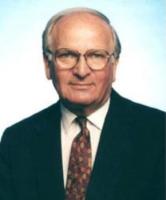| www.tmatlantic.com
Test & Soldering Equipment On-line Store |
|
D.E.V.I.C.E. (Wiki)Calculators Services |
|||||
Filter by first letter
|
Schrieffer, John Robert
John Robert Schrieffer was on May 31, 1931, in Oak Park, Illinois, then in 1940 moved with his family to Manhasset, New York, and then in 1947 to Eustis, Florida. In his Florida days, John Robert Schrieffer enjoyed playing with homemade rockets and ham radio, a hobby that sparked an interest in electrical engineering. After graduating from Eustis High School in 1949, Schrieffer was admitted to the Massachusetts Institute of Technology, where for two years he majored in electrical engineering before switching to physics in his junior year. He completed a bachelor's thesis on multiplets in heavy atoms under the direction of John C. Slater in 1953. Pursuing an interest in solid-state physics, Schrieffer began graduate studies at the University of Illinois at Urbana–Champaign, where he was hired immediately as a research assistant to John Bardeen. After working out a theoretical problem of electrical conduction on semiconductor surfaces, Schrieffer spent a year in the laboratory, applying the theory to several surface problems. In his third year of graduate studies, he joined Bardeen and Cooper in developing the theory of superconductivity. In January 1957 Schrieffer got an idea of how to describe mathematically the ground state of superconducting electrons. Schrieffer and Bardeen's collaborator Cooper had discovered that electrons in a superconductor are grouped in pairs, now called Cooper pairs, and that the motions of all Cooper pairs within a single superconductor are correlated and function as a single entity due to phonon-electron interactions. Schrieffer's mathematical breakthrough was to describe the behavior of all Cooper pairs at the same time, instead of each individual pair. The day after returning to Illinois, Schrieffer showed his equations to Bardeen, who immediately realized they were the solution to the problem. The BCS theory (Bardeen-Cooper-Schrieffer) of superconductivity, as it is now known, accounted for more than 30 years of experimental results that had stymied some of the greatest theorists in physics. After completing his doctoral dissertation on the theory of superconductivity, Schrieffer spent the 1957–1958 academic year as a National Science Foundation fellow at the University of Birmingham in England and at the Niels Bohr Institute in Copenhagen. In 1964, John Robert Schrieffer published his book on the BCS theory, Theory of Superconductivity. He held honorary degrees from the Technical University of Munich and the University of Geneva. In 1972, he, along with Bardeen and Cooper, won the 1972 Nobel Prize in Physics for developing the BCS theory. In 1980, Schrieffer became a professor at the University of California, Santa Barbara, and rose to chancellor professor in 1984. In 1992, Florida State University appointed Schrieffer as a university eminent scholar professor and chief scientist of the National High Magnetic Field Laboratory, where he continued to pursue one of the great goals in physics: room temperature superconductivity. He died in late July 2019, at the age of 88. Citing Wikipedia.org |
Site mapPrivacy policyTerms of Use & Store PoliciesHow to BuyShippingPayment




|

























